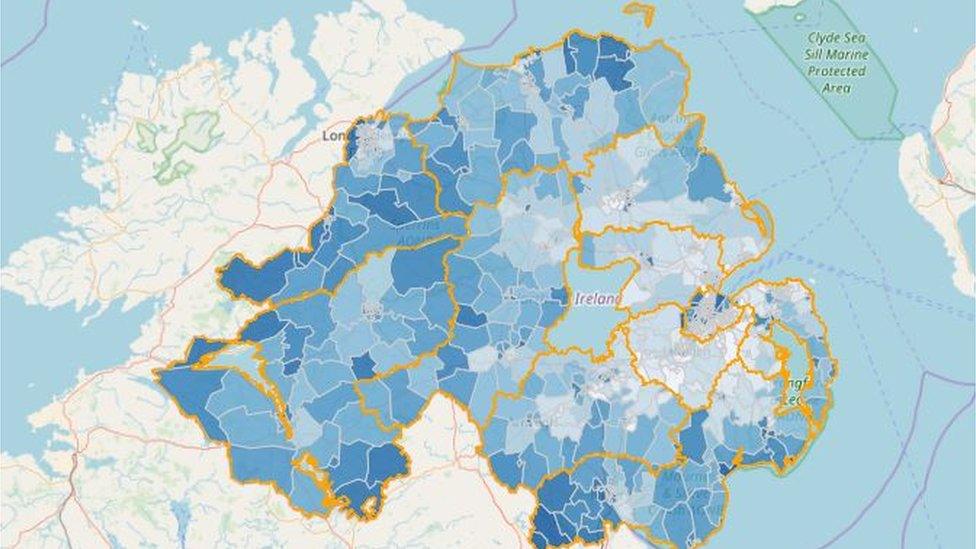Belfast 'has UK's most avoidable deaths'
- Published
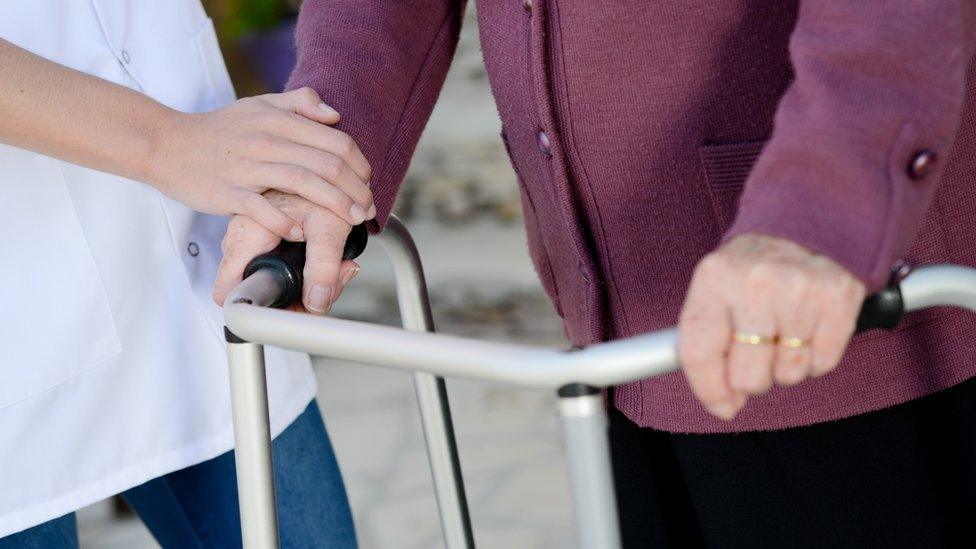
The mortality rate in deprived areas is more than three times higher than in affluent areas
People living in the poorest parts of Belfast are more likely to die prematurely than in any other area of the UK.
Derry City and Strabane has the second highest rates of avoidable deaths.
Across the UK the mortality rate from avoidable causes is more than three times higher in deprived areas than in the most affluent.
The government said it was taking action to help people live longer and healthier lives.
The BBC's Shared Data Unit analysed data from the Office for National Statistics with deprivation data for local authority areas in England and Wales, as well as comparable data for Scotland and Northern Ireland.
England, Wales and Scotland records avoidable death rates for local authority areas, but does not sub-divide into deprived and non-deprived.
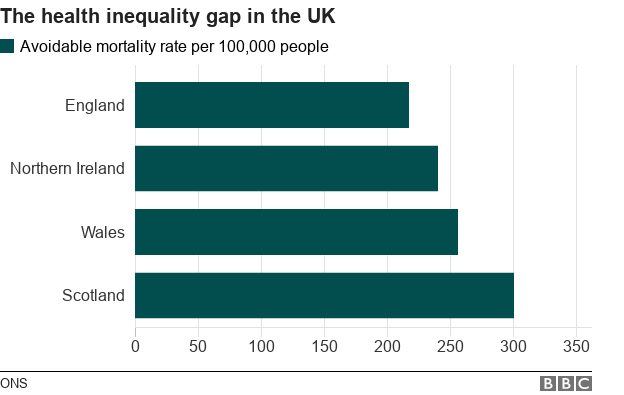
Our analysis found a strong correlation between deprivation and the number of people dying prematurely.
Avoidable death rates range from 138 deaths per 100,000 in affluent areas such as Chiltern in Buckinghamshire to 517 per 100,000 in the poorest parts of Belfast.
Jon Date, head of external affairs at the independent think tank the International Longevity Centre-UK, said: "The reasons behind these disparities are complex, but it is utterly unacceptable to witness a growing health divide in 21st Century Britain."
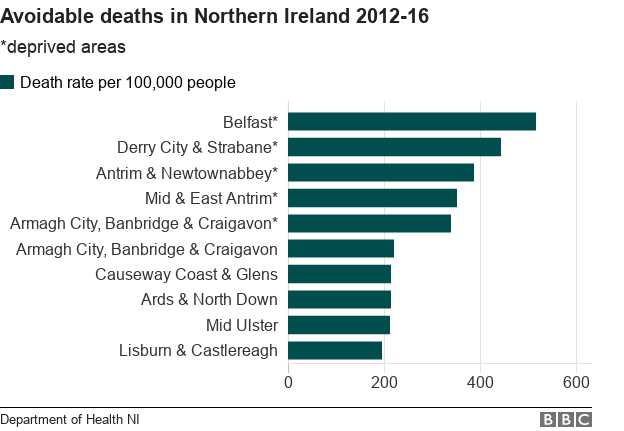
Although overall Northern Ireland has less avoidable deaths than Scotland or Wales, individual areas of deprivation are among the worst.
While deprived areas of Belfast and Derry City & Strabane have the highest premature death rates in the UK.
Antrim & Newtownabby and Mid & East Antrim council areas also have higher than average early mortality rates.
What is an avoidable death?
Deaths in people under 75 from heart disease, some cancers, respiratory conditions and type 2 diabetes are among those classed as avoidable with "timely and effective healthcare."
The list dates back to the 1970s when it was drawn up help develop effective public heath interventions and care.
What's being done?
The Department of Health in Northern Ireland said reducing inequalities was a "huge challenge".
A spokesman for the Public Health Agency in Belfast said: "It is well established that the poorest people live the shortest lives with the worst health."
To help change this trend the agency has invested in organisations which deliver health and wellbeing programmes - particularly in communities with high deprivation.
Among them are The Heart Project, which offers rehabilitation to people in Belfast who have suffered heart attacks or strokes, and a network of healthy living centres based in areas of high health inequalities.
"We have also increased early years support to young families to tackle long term health inequalities and invested in services for older people including the Belfast Health Development Unit, which provides a physical activity and health programme for people ages 65+."

'I couldn't even put my own shoes on'
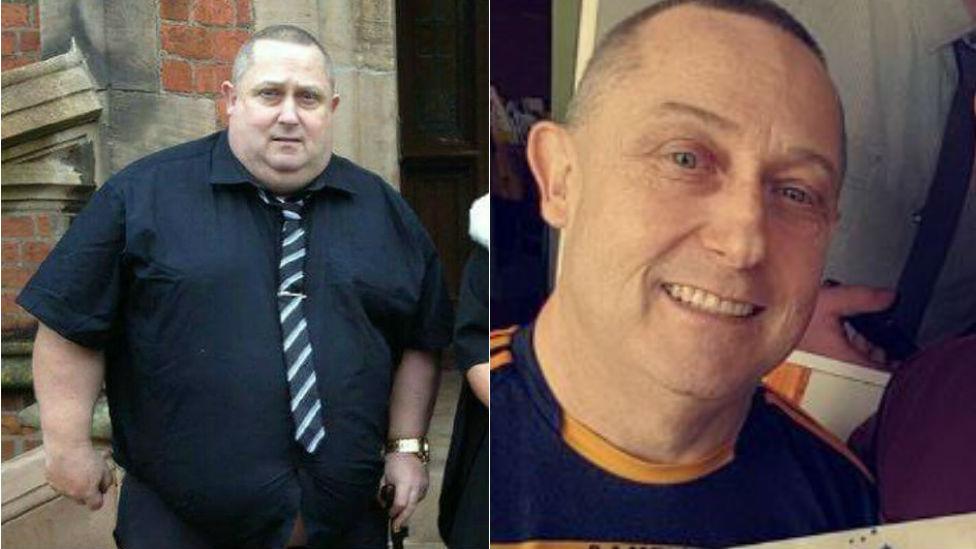
Gerard O'Neill weighed 27 stone before he was referred to one of Belfast's healthy living centres
Belfast father-of-six Gerard O'Neill says he doesn't know where he would be if he had not been referred to one of the city's healthy living centres.
Mr O'Neill has lost 12 stone in two years after receiving help from the Maureen Sheehan Centre in West Belfast.
The 55-year-old former fisheries officer was initially referred on a 12-week Healthwise plan by his GP after his weight ballooned while caring for his elderly mother as she battled dementia.
He said: "I hadn't got any time for myself and I was eating a lot of junk."
Following his mother's death, however, he decided he had "to do something" about his health and went to see his GP who referred him to the Maureen Sheehan Centre which has a small gym.
Mr O'Neill, who also started attending slimming classes, weighed 27 stone to begin with and he said: "I couldn't even put my own shoes on; my breathing was very bad and I couldn't walk much distance."
Through healthy eating and regular exercise, however, his weight dropped to around 15 stone - and he has even completed two 5km charity walks to raise money and awareness of Alzheimer's.
Not content to stop there, he has also rekindled a passion for handball and now coaches a youth team.
He has even completed a training course to rehabilitate cancer and heart attack survivors and said: "It's great to return something back."

More about this story
The Shared Data Unit makes data journalism available to news organisations across the media industry, as part of a partnership between the BBC and the News Media Association.
This piece of content was produced by local newspaper journalists working alongside BBC staff.
For more information on methodology, click here, external.
For the full dataset, click here, external.
Read more about the Local News Partnerships here.
- Published15 June 2017
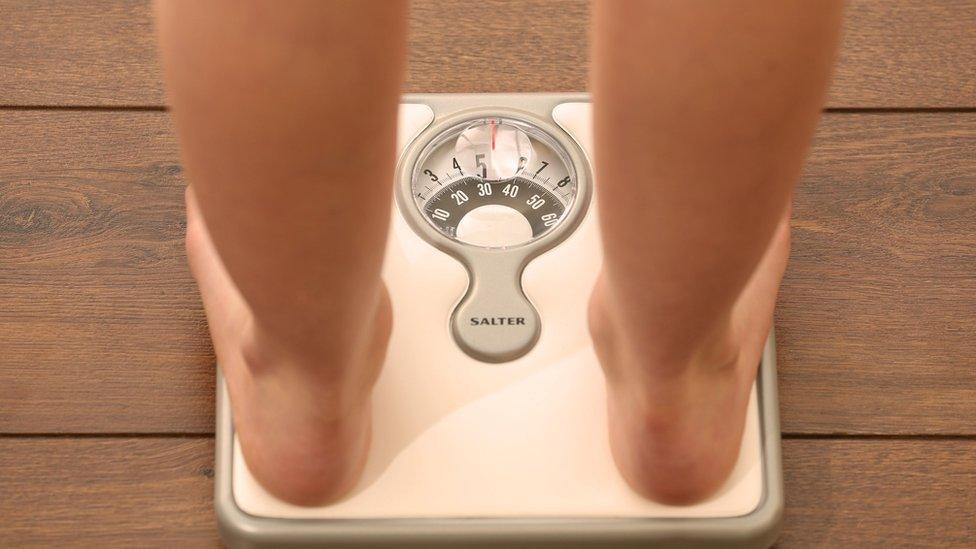
- Published24 November 2017
